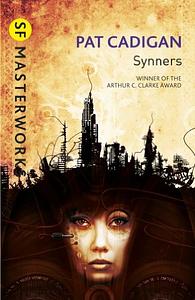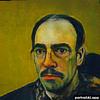Take a photo of a barcode or cover
'I want it to matter,' she said. 'I want the fucking music and the people to matter. I don't want fucking rock'n'roll porn to go with the med porn and the war porn and the weapons porn and the food porn - shit, it's all porn, goddamn fucking video porn?'
I do think it's a good piece of cyberpunk despite the book structure is not reader-friendly. I enjoyed the first pages with random cyberpunk images popping up in my head. And I was lost after that till the middle of the book because the action isn't so actionable. Then it goes better.
The blur between real and virtual is actually made well here. It is harder to read because of that but it adds a stylish touch.
And I do love how cyberpunk—this book is not an exception—reflects our world in a not-so-pleasant future. Today's AI/LLM concerns, content porn (we already generate so much content, it's already looks porn'ish), viral social media (a cascading stroke analogy), how we have separated offline and online identities, the list goes on.
Also, as a person working in Tech, I find the story about always lagging and bugging navigation on the roads particularly funny. It goes through the whole book and feels just like a meme about my life.
challenging
slow-paced
Plot or Character Driven:
N/A
Strong character development:
No
Loveable characters:
No
Diverse cast of characters:
Yes
Flaws of characters a main focus:
N/A
adventurous
challenging
reflective
slow-paced
Plot or Character Driven:
Plot
Strong character development:
No
Loveable characters:
Complicated
Diverse cast of characters:
Yes
Flaws of characters a main focus:
No
Synners - 4/5
If the time it took me to read this tells you anything then it should tell you that this book was a bit of a challenge for me. It's so dense, overloaded with jargon, surreal sections, and just straight-up ideas, that I ironically reached information overload and had to drop the book for a good couple of months. There's a lot here that I think will need a second read to properly unpack, one that I won't break up with a string of other books.
Despite all of that I still really enjoyed this novel. The characters are excellent and far more varied than your usual cyberpunk story, ranging from your somewhat standard gutter punk kids (although still with their own spin) to older folks who're caught up in the corporate machine to varying degrees. Furthermore, unlike most cyberpunk I've read Cadigan manages to write women well! It's so refreshing to see women who aren't solely present to be the fantasy of a sexy razorgirl, with the characters who most fits that description instead being a fully formed individuals all on their own, or used to deconstruct that trope. These aspects mean the book comes together feeling almost post-cyberpunk at times, whilst not dropping that anti-authoritarian cyberpunk feel. The dialogue, and writing in general, is also exceptional, flowing really well to create some of the best noirish/cyberpunk writing I've read anyplace. It lets you ride out some of the sentences that are more jargon-filled (be that technical or streetspeak) more smoothly than you'd be able to otherwise.
And the ideas! This book remains rooted in the whole late 80s/early 90s MTV Generation and the growing fear of what the developing internet could bring, much of the story is centred around creating music videos through entering something like cyberspace/the Matrix, but it reaches forward still by touching on our modern fears about information overload and lack of context in the present. It both interrogates those fears of technology whilst highlighting just how they really haven't changed all that much in recent years, just the context surrounding them.
Overall, a really great book that I found to be quite a difficult read. It leads me to a strange situation where I often agree with both the top negative and top positive reviews I've seen of Synners, both here on Goodreads and elsewhere. Still, I'd recommend at least giving it a go, especially if you're into cyberpunk media.
If the time it took me to read this tells you anything then it should tell you that this book was a bit of a challenge for me. It's so dense, overloaded with jargon, surreal sections, and just straight-up ideas, that I ironically reached information overload and had to drop the book for a good couple of months. There's a lot here that I think will need a second read to properly unpack, one that I won't break up with a string of other books.
Despite all of that I still really enjoyed this novel. The characters are excellent and far more varied than your usual cyberpunk story, ranging from your somewhat standard gutter punk kids (although still with their own spin) to older folks who're caught up in the corporate machine to varying degrees. Furthermore, unlike most cyberpunk I've read Cadigan manages to write women well! It's so refreshing to see women who aren't solely present to be the fantasy of a sexy razorgirl, with the characters who most fits that description instead being a fully formed individuals all on their own, or used to deconstruct that trope. These aspects mean the book comes together feeling almost post-cyberpunk at times, whilst not dropping that anti-authoritarian cyberpunk feel. The dialogue, and writing in general, is also exceptional, flowing really well to create some of the best noirish/cyberpunk writing I've read anyplace. It lets you ride out some of the sentences that are more jargon-filled (be that technical or streetspeak) more smoothly than you'd be able to otherwise.
And the ideas! This book remains rooted in the whole late 80s/early 90s MTV Generation and the growing fear of what the developing internet could bring, much of the story is centred around creating music videos through entering something like cyberspace/the Matrix, but it reaches forward still by touching on our modern fears about information overload and lack of context in the present. It both interrogates those fears of technology whilst highlighting just how they really haven't changed all that much in recent years, just the context surrounding them.
Overall, a really great book that I found to be quite a difficult read. It leads me to a strange situation where I often agree with both the top negative and top positive reviews I've seen of Synners, both here on Goodreads and elsewhere. Still, I'd recommend at least giving it a go, especially if you're into cyberpunk media.
"Who do you love?"
Although published in 1991 the world of Synners and L.A in the late 80's still feels relevant. More relevant than a lot of cyberpunk, even late first wave ones such as this. Pat Cadigan missed the normal technological advancements the genre is known for such as: cell phones. But reading it doesn't feel archaic though, maybe because it's a hard, purposeful look at nostalgia itself.
"The way we all kept adding to the nets did exactly that, passed a threshold. It got to the point where the net should have collapsed in chaos, but it didn't. Or rather it did, but the collapse was not a collapse in the conventional sense."
GridLid automates your car completely even handles all the traffic jams, resulting in people being fearful of non-automated systems, never having driven "manually" before. Entertainment is imbibed while the bumper-to-bumper traffic takes you hours to get to work. There is porn for everything. Traffic porn, med porn, war porn, food porn. People get off on most anything that's packaged as entertainment. And the stuff that isn't trending now, is gone. Viruses are prevalent and are just a hazard of the world; most people don't know how to get rid of them. Discarding technical know-how for the ease of products automating their lives.
That's where the punks come in, the hackers.
"If you can't fuck it and it doesn't dance. Eat it or throw it away."
A slow build up hampers the book at first. Most of the pages are reserved for introductions to each. Though effective in the long term, it does take a while to get into it. But once it's done showing you the characters and by proxy, the world—the book is undeniably richer for it.
Where Synners is so interesting compared to some other first wave novels (beyond the world building aspects) is that there is kind of a post-cyberpunk vibe happening throughout, intentional or otherwise.
"We don't grieve for what might have been in rock'n'roll. We just keep rockin' on."
Gina is old enough to remember and venerate "properly," rock'n'roll music. This lauding of a wave that died out, along with the notion that "punk" is also dead is a consistent through line, reinforced with vivid imagery of music videos and lyrics from songs that just won't leave her alone. She is stuck in a self destructive loop that is explained by the impulses of the human body, rooting her problems in her humanity. Her pain seems to stem from her embodiment, yet she still wouldn't change a thing. Hard life, hard love, hard everything.
"Back in Mexico, when he first put the wires in when you were there. If you'd leaned down then, put your mouth on his, he might have stayed. Because after that nothing could pull him back, not love, not sex, not you. Not nothing, not no-how."
Visual Mark on the other hand chooses the "datalines" (the Internet) instead. Once a close couple, madly in love, eating each other up—now mature and unable to carry on with their relationship; effectively due to the past. Their mistakes, their nostalgia for them, and the various forms of coping so they don't ever have to deal with it, all damning of the societal structures in place. Mark unwilling to take true responsibility for them, instead shrugging them off to the system.
"He was still wondering what would become of him when he felt the first shock wave, followed by the last message he would ever receive from the meat."
The main thrust of the book is that "sockets" are invented, which would also be antiquated tech in most cyberpunk novels, and the world dives right in because capitalism. Diversifications, a megacorporation disseminates this new and unsafe tech to the masses. And while Gina hungers for the same power to make music videos "alive" again through the use of this technology, possibly rekindling everyone's love for rock'n'roll again, as well as Mark's own love for her. Mark allows it to consume him whole.
Through the eyes of many of the characters we see what capitalism has wrought. Only this time it's through this more interesting lens rooted in music; quizzically, not punk. The idea that the first wave was almost gone and along with it, cyberpunk as a subgenre, parallels Gina and Mark's struggle with their past and glory days. How enticing our memories make events that were actually horrible; allowing us to view the wreckage of our lives with rose-coloured glasses. Post-cyberpunk in that it seems to critically evaluate the genre, subverting it in a few places.
"This ain't rock'n'roll. It ain't been rock'n'roll for a long fucking time. This is business, and money, and change for the machines, but it ain't rock'n'roll.
Mark himself could represent the genre as it existed in first wave. He is an anti-hero, unlikeable but attractive in non-conformative ways. His past has destroyed parts of him, including some brain damage that makes him even better at using tech to become more than he is now, transcending himself. Leaving "the meat," as he so often refers to it, behind. He has a particular affinity and knack for something because society has fucked him up; the "system" has damaged him. The typical protagonist for early cyberpunk.
"I'm not really in there, now. I'm maintaining it, but there's nobody home. I know it doesn't happen that way for you, but that's how it is for me. "
Gina can interact with people just fine, though. She is more-or-less "well adjusted" and chooses to be a voice of dissent. Picking physical conflicts and verbal ones, choosing embodiment every step of the way. How she interacts with people, especially if they are seen by her as being a part of the system that has essentially destroyed the love of her life, Visual Mark, is by being angry. Being a punk. She is a part of an older generation, now been left behind. She's angry, and tired, and does exactly what she wants when she wants to. The only weakness she has is Mark, the personification of this old way of life that she cannot let go. The wound in her mouth that would heal; if she'd only stop tonguing it.
The book is primarily (as I see it) about examining embodiment; the products of our society and commodification of anything of value. Who power structures benefit and what those wounds might look like in a cyberpunk future becoming an allegory for the targeting of the unlucky few, who grow to be far too many. How powerful nostalgia is, a resurgence of it being inevitable, often; usually by means of any advancement in technologies. It's smart, funny, at times; easy to empathize with, and features good prose mixed with a cyberpunk aesthetic that feels like a prequel while being critical of the genre as it was about to "die."
It's worth reading.
"But it's different when you think you have no choice, and then suddenly you do after all."
Although published in 1991 the world of Synners and L.A in the late 80's still feels relevant. More relevant than a lot of cyberpunk, even late first wave ones such as this. Pat Cadigan missed the normal technological advancements the genre is known for such as: cell phones. But reading it doesn't feel archaic though, maybe because it's a hard, purposeful look at nostalgia itself.
"The way we all kept adding to the nets did exactly that, passed a threshold. It got to the point where the net should have collapsed in chaos, but it didn't. Or rather it did, but the collapse was not a collapse in the conventional sense."
GridLid automates your car completely even handles all the traffic jams, resulting in people being fearful of non-automated systems, never having driven "manually" before. Entertainment is imbibed while the bumper-to-bumper traffic takes you hours to get to work. There is porn for everything. Traffic porn, med porn, war porn, food porn. People get off on most anything that's packaged as entertainment. And the stuff that isn't trending now, is gone. Viruses are prevalent and are just a hazard of the world; most people don't know how to get rid of them. Discarding technical know-how for the ease of products automating their lives.
That's where the punks come in, the hackers.
"If you can't fuck it and it doesn't dance. Eat it or throw it away."
A slow build up hampers the book at first. Most of the pages are reserved for introductions to each. Though effective in the long term, it does take a while to get into it. But once it's done showing you the characters and by proxy, the world—the book is undeniably richer for it.
Where Synners is so interesting compared to some other first wave novels (beyond the world building aspects) is that there is kind of a post-cyberpunk vibe happening throughout, intentional or otherwise.
"We don't grieve for what might have been in rock'n'roll. We just keep rockin' on."
Gina is old enough to remember and venerate "properly," rock'n'roll music. This lauding of a wave that died out, along with the notion that "punk" is also dead is a consistent through line, reinforced with vivid imagery of music videos and lyrics from songs that just won't leave her alone. She is stuck in a self destructive loop that is explained by the impulses of the human body, rooting her problems in her humanity. Her pain seems to stem from her embodiment, yet she still wouldn't change a thing. Hard life, hard love, hard everything.
"Back in Mexico, when he first put the wires in when you were there. If you'd leaned down then, put your mouth on his, he might have stayed. Because after that nothing could pull him back, not love, not sex, not you. Not nothing, not no-how."
Visual Mark on the other hand chooses the "datalines" (the Internet) instead. Once a close couple, madly in love, eating each other up—now mature and unable to carry on with their relationship; effectively due to the past. Their mistakes, their nostalgia for them, and the various forms of coping so they don't ever have to deal with it, all damning of the societal structures in place. Mark unwilling to take true responsibility for them, instead shrugging them off to the system.
"He was still wondering what would become of him when he felt the first shock wave, followed by the last message he would ever receive from the meat."
The main thrust of the book is that "sockets" are invented, which would also be antiquated tech in most cyberpunk novels, and the world dives right in because capitalism. Diversifications, a megacorporation disseminates this new and unsafe tech to the masses. And while Gina hungers for the same power to make music videos "alive" again through the use of this technology, possibly rekindling everyone's love for rock'n'roll again, as well as Mark's own love for her. Mark allows it to consume him whole.
Through the eyes of many of the characters we see what capitalism has wrought. Only this time it's through this more interesting lens rooted in music; quizzically, not punk. The idea that the first wave was almost gone and along with it, cyberpunk as a subgenre, parallels Gina and Mark's struggle with their past and glory days. How enticing our memories make events that were actually horrible; allowing us to view the wreckage of our lives with rose-coloured glasses. Post-cyberpunk in that it seems to critically evaluate the genre, subverting it in a few places.
"This ain't rock'n'roll. It ain't been rock'n'roll for a long fucking time. This is business, and money, and change for the machines, but it ain't rock'n'roll.
Mark himself could represent the genre as it existed in first wave. He is an anti-hero, unlikeable but attractive in non-conformative ways. His past has destroyed parts of him, including some brain damage that makes him even better at using tech to become more than he is now, transcending himself. Leaving "the meat," as he so often refers to it, behind. He has a particular affinity and knack for something because society has fucked him up; the "system" has damaged him. The typical protagonist for early cyberpunk.
"I'm not really in there, now. I'm maintaining it, but there's nobody home. I know it doesn't happen that way for you, but that's how it is for me. "
Gina can interact with people just fine, though. She is more-or-less "well adjusted" and chooses to be a voice of dissent. Picking physical conflicts and verbal ones, choosing embodiment every step of the way. How she interacts with people, especially if they are seen by her as being a part of the system that has essentially destroyed the love of her life, Visual Mark, is by being angry. Being a punk. She is a part of an older generation, now been left behind. She's angry, and tired, and does exactly what she wants when she wants to. The only weakness she has is Mark, the personification of this old way of life that she cannot let go. The wound in her mouth that would heal; if she'd only stop tonguing it.
The book is primarily (as I see it) about examining embodiment; the products of our society and commodification of anything of value. Who power structures benefit and what those wounds might look like in a cyberpunk future becoming an allegory for the targeting of the unlucky few, who grow to be far too many. How powerful nostalgia is, a resurgence of it being inevitable, often; usually by means of any advancement in technologies. It's smart, funny, at times; easy to empathize with, and features good prose mixed with a cyberpunk aesthetic that feels like a prequel while being critical of the genre as it was about to "die."
It's worth reading.
"But it's different when you think you have no choice, and then suddenly you do after all."
adventurous
dark
mysterious
reflective
medium-paced
Plot or Character Driven:
A mix
Strong character development:
Complicated
Loveable characters:
Complicated
Diverse cast of characters:
Yes
Flaws of characters a main focus:
Complicated
A wild, lyrical, unforgettable classic. I have no idea how this never got on my radar until now. There is something here that is more than just a genre novel, a poem, some other thing that communicates a feeling, an impression of the same hallucinatory effect the characters themselves are experiencing. I did not appreciate while in the midst of the book some of the non sequiturs, the random lyrics and images, out of place phrases, the lack of many concrete environmental descriptions. But by the end the tapestry weaves back together and all those strands and odd details come back and provide an almost shocking sense of unity to the entire narrative. A hypnotic ride through a fully realized cyberpunk world, with a payoff worthy of the journey.
adventurous
tense
medium-paced
Plot or Character Driven:
Plot
Strong character development:
Yes
Loveable characters:
Yes
Diverse cast of characters:
Yes
Flaws of characters a main focus:
Yes
adventurous
challenging
dark
inspiring
reflective
slow-paced
Plot or Character Driven:
A mix
Strong character development:
Yes
Loveable characters:
Yes
Diverse cast of characters:
Yes
Flaws of characters a main focus:
Yes
I'd kinda forgotten how much I love good cyberpunk until I read this. Turns out I really really like it.
Interestingly, in many ways this feels like a prequel to much of the cyberpunk I've read. The main contention is the invention of putting sockets into people's heads to allow them to experience and manipulate the datelines (read: internet) more directly... the result of which, or something similar, is what Gibson and Scott and their friends are basically examining. So from a 'getting started' perspective I found this book really awesome, and in lots of other ways too.
Cadigan takes the 'cast of thousands' approach, using multiple perspectives (although always in third person) to show lots of different dimensions and angles to the story. There were times at which this was a bit confusing, but on reflection I wonder if this wasn't done intentionally. There were quite a few chapters which shifted perspective where the new character could have been one of several, and it's only revealed whose story we're reading after a page or so. This contributed to the fairly frenetic feel that the entire book indulges in, which is largely appropriate given the madness that ensues in the second half of the story. It's also very nice because the variety of characters and their individual stories give wonderful perspective and insight into different aspects of the story. Which I liked.
The world Cadigan has created is simultaneously a bit dated - it was published in 1991 - but, once some of the terms are translated, also quite recognisable. She talks of datalines and how people get their news; that's basically souped-up data retrieval services and massively hyped up RSS readers that do the work for you. And then they use the sockets initially to rev up rock music videos, which is just such an hysterically funny idea that the sheer bizarreness just carried me away giggling and happily belief-suspended. Also, there's a lot of drug use. Which is perhaps neither here nor there, but also certainly adds to the manicness.
The plot revolves around the introduction of sockets and what that might mean for society, with a whole lot of corporate hijinkery and espionage and hackery as well. There's a father/daughter relationship that pops up every now and then - not something you see every day in this sort of futuristic novel - as well as, somewhat surprisingly when you see the characters, a love story that's not very romantic in one way, but actually really is sweet in a fierce I'll-deck-you sort of way. Plus a load of bizarre and whacked friendships and enmities that go a long way towards populating this world with dysfunctional but quite entertaining characters.
This was my first Cadigan novel. I'll be coming back for more. (In fact I have Tea from an Empty Cup sitting on my shelf....)








